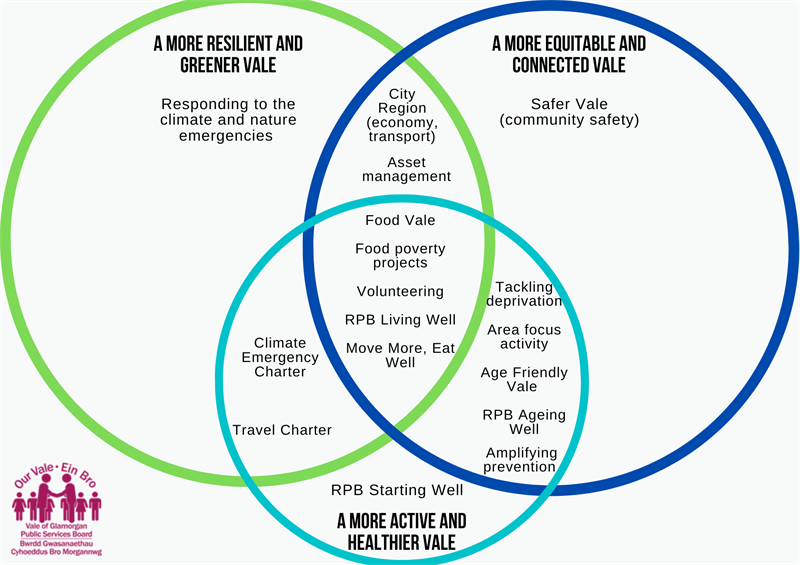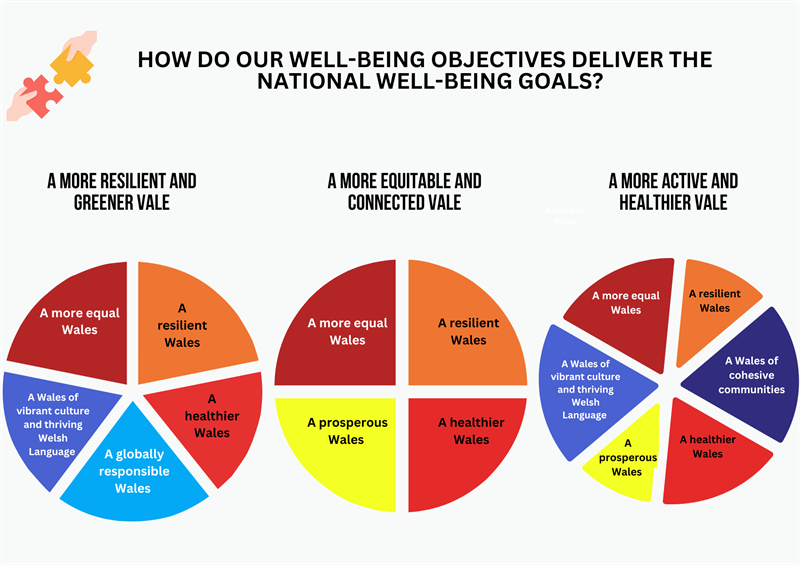Our Well-being Objetives
To achieve our vision of the future of the Vale, we will work over the next five years to deliver our three Well-being Objectives:
- A more resilient and greener Vale - by understanding and making the changes necessary as individuals, communities and organisations in response to the climate and nature emergencies.
- A more active and healthier Vale - by encouraging and enabling people of all ages to be more active and to promote the benefits of embracing a healthier lifestyle.
- A more equitable and connected Vale - by tackling the inequities that exist across the Vale, engaging with our communities and providing better opportunities and support to make a lasting difference.

These Objectives have been set in the context of the findings of the Assessment, the key challenges we currently face together with longer term needs including those of future generations and the ongoing work by partners, locally and regionally. The above diagram illustrates the interconnectivity between our thee Well-being Objectives and how different programmes of work and partnership activity (existing, new and revised) will contribute to delivering our Objectives. This demonstrates the breadth of activity being undertaken in partnership across the Vale.
We are confident that through these Objectives we can make a positive difference to social, economic, environmental, and cultural well-being and maximise our contribution to the National Well-being Goals. The ‘Our Well-being Objectives’ and ‘Delivering Our Well-being Objectives’ sections of this Plan provide further detail on how we have developed these Objectives, our priority workstreams and the range of activities and projects as detailed above that make up the steps that will contribute to the delivery of these Objectives. The image below shows in more detail how our objectives contribute to the national Well-being Goals. The matrix at the end of this section also details how the steps outlined below will deliver our priorities and Objectives and contribute to the national Well-being Goals.
Cultural Well-being and a thriving Welsh Language
The PSB is mindful that it is clear throughout the Plan how we will contribute to economic, social and environmental well-being but more work is needed to conisder how we embed work to promote cultural well-being and the Welsh Language. This needs to be integral to the delivery of our Well-being Objectives and priority workstreams and one aspect partners are keen to explore is how cultural activities can assist in our engagement activities, particularly to help us reach those who are seldom heard. We are also keen to explore how we can link work on climate change to different cultural activities. One example of our innovation is the work of Food Vale who in 2023 will be hosting a pilot Vale Food trail and we will be linking this to the impact our food choices have on the environment and our well-being. Cultural activities will also form part of our work to be more Age Friendly recognising the contribution they have to tackling loneliness and isolation and to overall well-being.
The PSB will also continue to promote the Welsh language through its work. According to the Census 2021 results, the Vale of Glamorgan is one of just four local authority areas where Welsh Language skills have increased since the Census 2011. The Vale PSB will continue to ensure that as it delivers the commitments in the Well-being plan that it is promoting the Welsh language and is contributing to Cymraeg 2050 and the vision of a million Welsh speakers by 2050.
Priority Workstreams
There is a wide range of work detailed in this Plan that will contribute to the delivery of our Objectives and the PSB has identified three priority workstreams where specific and additional shared focus is needed. These bring together a range of existing work but recognise the need to build momentum and challenge current ways of working to meet the needs and challenges highlighted in the Well-being Assessment. These priority workstreams are relevant to delivering all of our Objectives and will also contribute to all of the national Well-being Goals:
Responding to the climate and nature emergencies - Through this Well-being Plan the PSB is reiterating its commitment to lead by example to address the climate and nature emergencies, recognising our global responsibility to respond to both of these emergencies. The Well-being Assessment sets out some of the key issues for the Vale in terms of the climate and nature emergencies and partners recognise that the changes needed across our organisations and communities can best be achieved by working together. This will include consideration of transport, energy, food, biodiversity and how we use our buildings and land.
Working with people who live in our communities that experience higher levels of deprivation - The Well-being Assessment has highlighted the differences across the Vale and how these inequities have been exacerbated by the Covid 19 pandemic. In addition, the current cost of living crisis, particularly the increase in energy and food costs will impact even more on those already in poverty. There will be a particular focus on these areas of the Vale.
Becoming an Age Friendly Vale - Age Friendly Communities are defined by the World Health Organisation (WHO) as a place where 'policies, services, settings and structures support and enable people to age well'. The population aged 65-84 is projected to grow between 2019 and 2039 by 5,266 people and the population aged 85 and over by 2,904 people. Work to make the Vale more age friendly and a better place for people to grow old will make the Vale a friendlier place for all and will help ensure we continue to respect and value older people within our communities recognising their contribution, needs and aspirations. We will also recognise the role of cultural activities in bringing different generations together. This work will align to the Regional Partnership Board’s work on ageing well and will also have a strong preventative focus as partners work together to ensure services meet the diverse needs of the community, providing support and opportunities for residents of all ages.